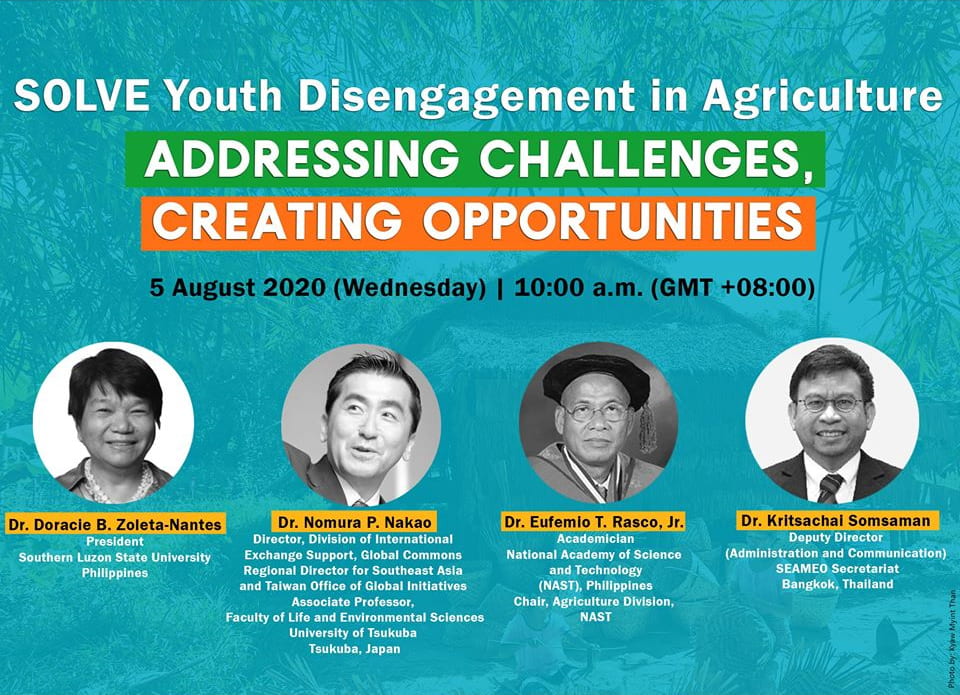Committed to pursue gender balance and inclusion of the younger generations among agricultural families and communities, the Southeast Asian Regional Center for Graduate Study and Research in Agriculture (SEARCA) conducted the SEARCA Online Learning and Virtual Engagement (SOLVE) webinar on "Youth Disengagement in Agriculture: Addressing Challenges, Creating Opportunities" on 5 August 2020 via Zoom and Facebook.
SOLVE webinars aim to provide an avenue for knowledge sharing on concrete innovative actions on the ground along SEARCA's 11th Five-Year Plan (2020-2025) via technology-mediated social platforms that would directly benefit farmers and farming families and engage the youth in ARD. Launched on 28 April 2020, the SOLVE webinars use the popular online platforms Zoom and Facebook and are livestreamed to interested audiences anywhere in the world.
In relation to the International Youth Day (IYD) celebration of the United Nations, SEARCA has shifted its focus on the role of gender and youth in ARD to balance gender representation and the youth among farmers and farming families. In its first installment for August 2020, the Center invited four distinguished speakers from Japan, the Philippines, and Thailand.
Dr. Kritsachai Somsaman, Southeast Asian Ministers for Education Organization (SEAMEO) Deputy Director (Administration and Communication), presented SEAMEO's various programs and opportunities for the youth as well as the newly established lecture series, "SEA-Teacher-TVET Lecture Series" that had its debut last 6 August. Dr. Somsaman also shared programs for the educators, one of which is the SEAMEO-Japan Education for Sustainable Development Award where the recipient of the award last year was one of the private schools located here in Los Baños, Laguna, the South Hill School, Inc. For this year 2020, the deadline for submission of entries to the SEAMEO ESD Award is August 14 with the theme, "Addressing Plastic Problems for Transforming Communities."
Complimenting on SEAMEO's initiatives, Dr. Nakao P. Nomura, Associate Professor of University of Tsukuba, Regional Director of Southeast Asia and Taiwan Office of Global Initiatives, and the Director of Division of International Exchange Support, Global Commons shared how agricultural sciences as a study field in Tsukuba, Japan flourished and served as an opportunity for higher education institutions. Dr. Nomura shared how his university, University of Tsukuba, resonates on the creation of knowledge for solution of global issues as a globally opened university with continuous reformation in response to change society. What University of Tsukuba did was to implement two actions to prevent students from leaving the field of agriculture. "We emphasize comprehensiveness of agriculture… and next we also introduced a concept of agriculture in relations with social issues to Japan." These two actions enabled their faculty to steer more students in opening their eyes to the importance of agriculture and technology in today's world.
Dr. Eufemio T. Rasco, Jr., who is also an Academician of the National Academy of Science and Technology (NAST), Philippines, tackled key lessons for the youth to be actively engaged in the field of agriculture. He emphasized that there are many opportunities in agriculture where young people can participate and dream deep. He concluded his presentation by giving three lessons: start farming by growing, do not just be a plant farmer but integrate vertically and horizontally, and study before starting farming and continue to study because learning is a never-ending process.
Lastly, Dr. Doracie B. Zoleta-Nantes discussed Southern Luzon State University's roadmap in curtailing youth disengagement in agriculture-related courses and food production. As President of SLSU, one of the action steps she shared in designing innovative pedagogical approaches as a result of the decreasing trend in enrolment to agricultural courses was to make the students realize that agriculture is not always back-breaking and tiring–there's a huge amount of high-tech innovations that are driving the sector. "We also encourage our students to collaborate with students and faculty members of industrial technology sector because there is a lot of small scale and middle scale farming [that] implements and facilities or equipment that we can use in order to increase and enhance food production," she said. Dr. Nantes also presented a comparative data of male and female enrollment in the College of Agriculture. "Increasingly through the years, our female enrollment has gone higher than the male enrollment. And this is true in all our curricular programs, in the agricultural technology program and environmental science program."
The theme of the 2020 IYD is "Youth Engagement for Global Action." It aims to provide assistance and nurture the potential of young people at the local, national, and global levels to increase their representation and visibility. In keeping with Accelerating Transformation Through Agricultural Innovation (ATTAIN) in Southeast Asia, this webinar together with the next two online conversations in August 2020 intends to shed a light on the problems and challenges as well as solutions that directly impact the lives of the young, including women.
Dr. Rasco reflected that "we have a shortage of dreamers and doers—young people, those who can think of possibilities and translate it into reality." The value of ARD and the importance of farmers, especially women and the young, must be given emphasis during the COVID-19 global health emergency. It is by adding them to our agricultural families where we can make a difference.
